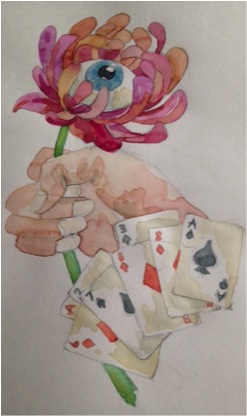So you say I can’t do GCSE PE? Well now I’m a Paralympian.
Interviewing Alice, the battles that she has already experienced are numerous. From a young age, she was underestimated in school – and one teacher remarked ‘well, lots of kids wear glasses, it’s no big deal’ when her parents attempted to explain her condition. As she progressed, she felt those who were there to inspire and motivate her never expected much from her academically. She was told she wouldn’t be able to cope with GCSE PE, yet she went on to become a Paralympian in Goalball!
Constant lack of encouragement can have a significant emotional impact on any individual yet Alice seems to take it all in her stride. She described the feelings of resilience she has built up over the years, stating ‘you get used to it, and you learn to laugh at it’. Alice’s belief is that ‘everyone gets dealt different cards. You just have to decide to get on with it and then it makes you stronger’. She suggests her visual impairment has made her more determined, as well as rendering her more aware of others and of disability in general.
We discussed the role of her parents as lifelong carers. Alice described the stress her parents endured during her diagnosis, worried for the future of their daughter, and understanding a threat to the great value of sight. Her parents were offered little emotional support; the sole focus being on biochemical and physiological care. Alice feels she will always need to live with or near to them, as she will never be able to drive or have the full independence she would like. The effect of a diagnosis on the whole family is something I will now consider throughout my medical training.
I chose to paint a hand holding a flower with an eye at the centre. The hand is to represent Alice’s parents, particularly her mother, and the constant support she offers her daughter and will need to continue to do so throughout her entire life. It also stands to symbolize the resilience with which she helped her daughter to develop in the face of adversity. The flower represents the concept that Alice has blossomed and thrived despite all of the obstacles that have been placed in front of her. The eye represents the initial source of Alice’s struggles. The playing cards represent her outlook and how she has dealt these cards and is going to play them to her best ability. Alice’s determination to live life to the fullest was evident; taking part in the 2016 Paralympics and going on to start her own very successful business. I chose to use bright watercolours because I did not feel that black and white or pencil alone would be able to portray the joy that Alice seems to receive from life.
It is clear that there will be many more battles due to others’ perception of Alice’s disability, however I have learned how someone’s disability does not put a limit on his or her abilities; it simply shapes the way in which they must go about achieving their goals.
*Name has been changed for anonymity reasons.

0 Comments